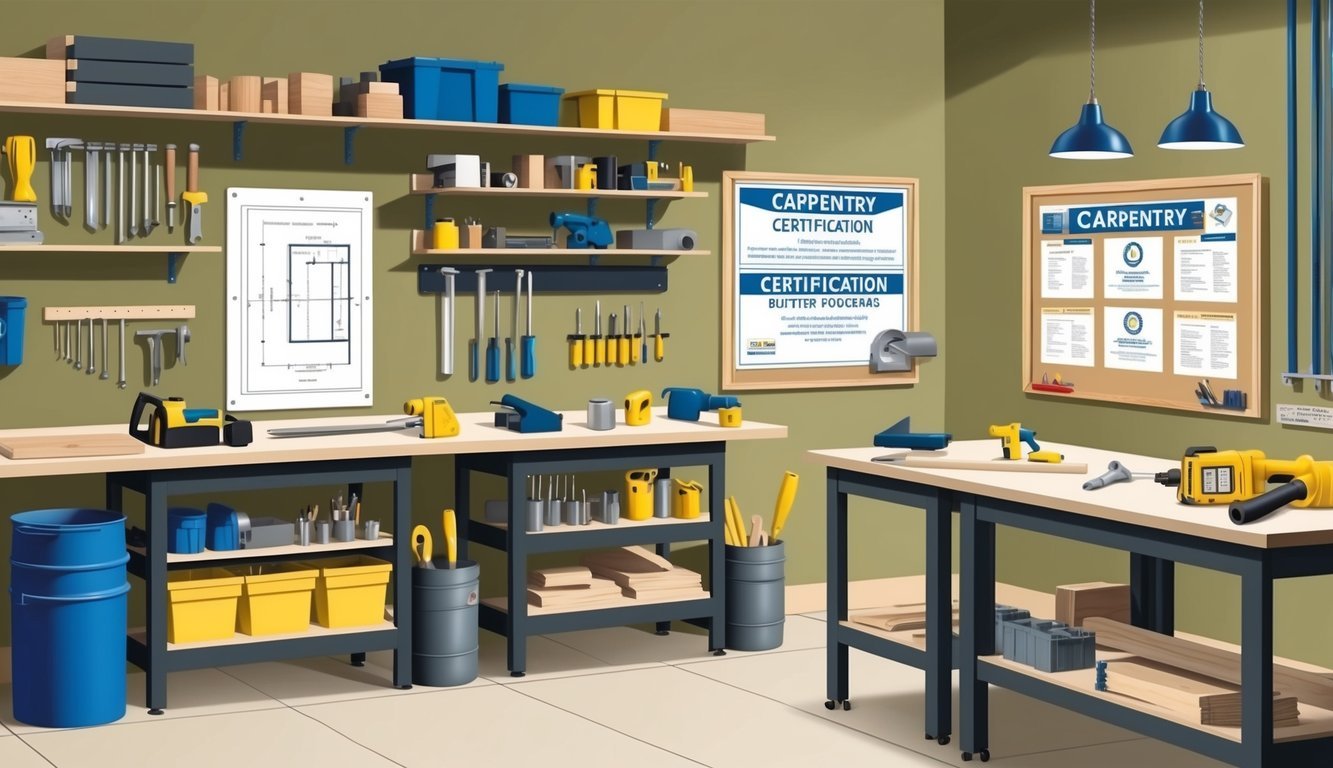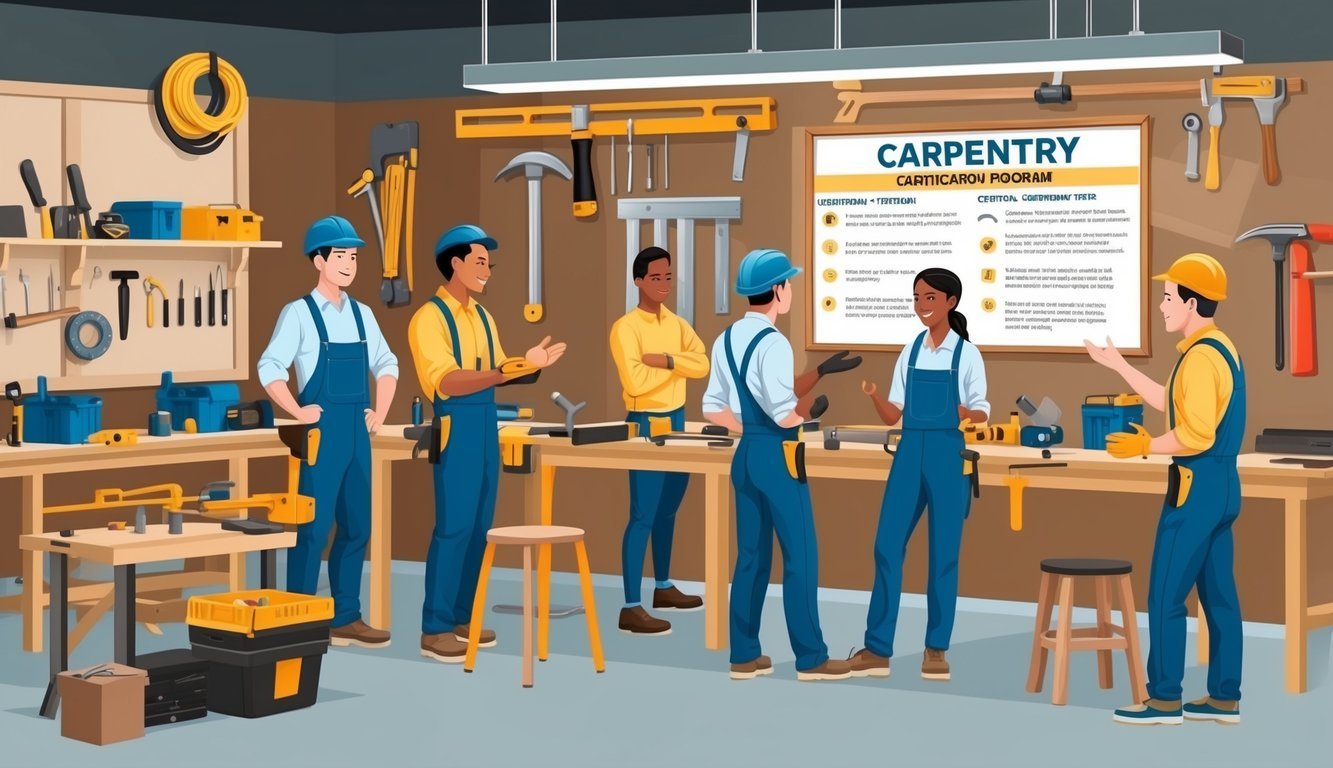“`xml
Are you ready to level up your carpentry skills? Getting certified might just be the ticket to unlocking new job opportunities and giving your career a boost.
Think about it: when you have a carpenter certification, employers see you as someone who can confidently take on complex projects safely and efficiently.
It’s a badge of honor in the carpentry world!

There are some fantastic carpentry certification programs out there that can help you sharpen your skills. These programs cover everything from safety protocols and building codes to blueprint reading and specialized techniques.
Whether you’re new to the field or looking to specialize further, there’s a certification that’s bound to fit your career goals.
Let’s take a look at five of the best options that can help you build a solid future in carpentry.
1) Penn Foster Career School Carpentry Program
Looking to kickstart a career in carpentry? The Construction Trades Career Diploma from Penn Foster might be exactly what you need.
This online program lets you learn at your own pace from the comfort of your home.
You’ll dive into the basics of carpentry and construction, covering vital topics like reading blueprints and understanding building codes.
These skills are essential if you want to make a mark as a carpenter!
One of the best things about this program? You can study whenever it suits you—whether it’s during lunch breaks or after the kids are tucked in.
No need to shuffle schedules for set class times!
The interactive videos and simulations included in the course give you a feel for real-world carpentry tasks, almost like getting hands-on experience without stepping outside your door.
Once you wrap up the course, you’ll be ready to jump into entry-level carpentry jobs, whether that’s tackling home renovations, crafting furniture, or even assisting in building projects.
It’s a great way to kickstart your journey in the construction trades!
2) Ashworth College’s Carpentry Course

Want to hone your carpentry skills from the comfort of your couch? Ashworth College’s online carpentry program is designed to give you a strong foundation in carpentry.
You’ll be studying at your own pace, which is perfect if you’ve got a busy schedule juggling work or family.
This course covers everything from basic woodworking to advanced construction techniques, so you’ll be well-rounded by the time you finish.
It’s fully online, meaning you don’t have to deal with the hassle of commuting or restrictive schedules.
You’ll dig into topics like blueprint reading, safe tool usage, and building codes, plus you’ll learn how to pick the right materials for your projects.
Being part of the Penn Foster Network, they’ve got a tried-and-true reputation in distance education that spans over 130 years.
You’ll end up with a career diploma to show prospective employers you mean business.
3) North Bennet Street School Carpentry Program
If you’re on the lookout for expert training in carpentry, the 36-week Carpentry program at North Bennet Street School in Boston is a fantastic choice.
You’ll get hands-on training with both hand tools and machinery from seasoned pros.
This program covers everything from basic woodworking to complex building projects.
You’ll learn to read blueprints, adhere to building codes, and tackle work both in homes and commercial spaces.
The focus here is on quality craftsmanship.
You’ll get to work alongside experienced carpenters who absolutely love what they do.
Not to mention, there’s a two-year Preservation Carpentry program for anyone interested in restoring historic structures!
What’s even better? Employers value NBSS graduates, so you’ll be job-ready when you finish.
Plus, they offer short-term courses if you’re not quite ready for a full commitment.
4) Sawyer School’s Carpentry Certification

Hey there, aspiring carpenter! If you’re looking for a solid certification, Sawyer School’s got your back.
Their Construction Technology program covers all the essentials, from building materials to job site safety—crucial knowledge for anyone wanting to succeed in carpentry.
Next, you’ll dive into the Carpentry Certificate program.
There, you’ll get the scoop on tool usage, blueprint reading, and even get some hands-on building experience.
How cool is that?
One standout feature? Sawyer School has strong ties with local construction companies, which means you might land an apprenticeship or job soon after you graduate.
They stay current with the latest building techniques, so you’ll be up-to-date when you step into the workforce.
5) Laurel Technical Institute Carpentry Program

Hoping to build a solid carpentry career? The Carpentry program at Laurel Technical Institute offers hands-on training to help you get there.
You’ll learn about framing, finish work, and cabinet making—combining both residential and commercial techniques.
Instructors at Laurel Technical Institute are experienced carpenters themselves.
They’ll share plenty of practical tips and tricks along the way, plus you’ll learn about safety practices and building codes.
It’ll be like having a mentor right there with you!
Once you complete the program, you’ll be equipped for entry-level carpentry jobs, and their job placement services might just give you a leg up in finding work.
Plus, with several campus locations, you can choose one that suits you best, and they offer flexible scheduling to fit your life.
Understanding Carpentry Certifications
Carpentry certifications are a clear way to show you’ve got the skills needed for the job.
They can help you access better job opportunities and often come with higher pay, too!
Benefits of Certification
Getting certified can really make a difference in your carpentry career.
It shows potential employers that you’re serious about your craft and have the needed skills. Certified carpenters often snag better job prospects, stepping into roles like lead carpenter or project manager, which usually come with a bump in salary.
And let’s not forget about safety! Certifications like the OSHA 30 certification focus on workplace safety, which helps reduce accidents on the job—definitely something to think about!
Certification Requirements
Before you can get certified, you’ll need to tick a few boxes.
The requirements can vary by program, but common needs include some on-the-job experience, perhaps through an apprenticeship or working under a licensed carpenter.
You’ll also need to pass an exam that tests your practical skills and theoretical knowledge—kind of like a written and hands-on driver’s test for carpentry.
Some certifications, such as the Journeyman Carpenter Certification, require you to undergo an apprenticeship program, which can take about 3 to 4 years to complete.
Ongoing education is often part and parcel of maintaining your certification.
You may need to take courses or attend workshops to stay updated on new techniques and safety standards.
How to Choose the Right Program

Choosing the right carpentry certification program requires some thought.
You’ll want to consider a few key factors to find the best fit for your goals and lifestyle.
Program Duration and Flexibility
First, think about how much time you can commit. Carpentry certification programs come in a variety of lengths—some are just a few weeks, while others might stretch over months or even years.
If you need a quick certification, short programs that focus on specific skills or safety training could be right up your alley.
Longer programs usually dig deeper into the subject matter, providing a more thorough education.
Also, look for flexible options if you’ve got work or family obligations.
Many schools offer evening or weekend classes, and online courses are perfect for those needing to fit study around their schedules.
Cost and Financial Aid Options
Of course, we can’t forget about money.
Prices for carpentry programs can vary quite a bit.
It’s essential to check if the program you’re considering offers financial aid, scholarships, or payment plans to help ease the burden.
Some employers might even pitch in for your training cost!
Keep an eye out for additional expenses like tools or books—they can sneak up on you! And don’t forget about apprenticeships, which often pair paid work with affordable or free training.
It’s a fantastic way to learn while earning a paycheck!
Frequently Asked Questions

Thinking about pursuing a carpentry certification? You probably have some questions running through your mind.
Let’s tackle some of the most common ones.
What certifications are necessary to become a professional carpenter?
Good news! You don’t always need certifications to work as a carpenter, but they can definitely help you stand apart from the crowd.
Starting with the OSHA 30 certification is a solid move since it covers essential job safety procedures.
Some jobs might request specific certifications, and those can vary by state or employer.
Which colleges are known for the best carpentry programs?
A few schools really shine in offering quality carpentry programs.
You can’t go wrong with Penn Foster Career School, North Bennet Street School, or Ivy Tech Community College.
These institutions provide the training you need to succeed.
How can international students find top carpentry certification programs?
International students can certainly find schools that welcome them! Look for institutions that accept foreign students and inquire if they offer visas.
Some online programs open their doors to learners across the globe, too.
It’s a good idea to reach out to the schools directly for details about their policies regarding international applicants.
What’s the process to become a certified carpenter in Florida?
In Florida, you don’t need a state license to work as a carpenter.
However, specific jobs might have licensure requirements—some localities set their own rules, too.
Many people get their start by joining an apprenticeship program, and from there, they can pursue certification exams if they choose.
Are there tailored carpentry schools for adult learners?
You bet! Numerous schools cater to adult learners.
For instance, Ashworth College offers flexible online courses, while Sawyer School has programs designed for busy adults.
They recognize that many of us have jobs and families to juggle!
Through what means do most carpenters acquire their skills?
Most carpenters learn through a blend of different avenues.
Many kick off their careers with an apprenticeship that lets them learn on the job, others might attend trade schools like Laurel Technical Institute, and some dive into online courses.
No matter how you learn, hands-on practice is crucial.
Remember, you can always continue picking up new skills throughout your carpentry journey.
“`

